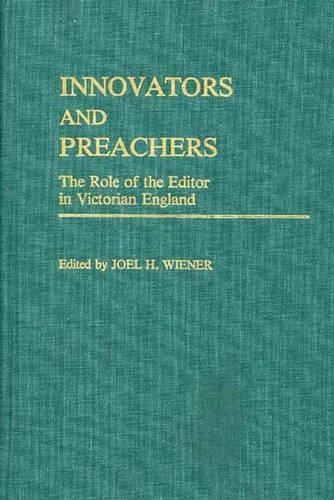
Innovators and Preachers: The Role of the Editor in Victorian England
(Hardback)
Publishing Details
Innovators and Preachers: The Role of the Editor in Victorian England
By (Author) Joel H. Wiener
Bloomsbury Publishing PLC
Praeger Publishers Inc
17th December 1985
United States
Classifications
Tertiary Education
Non Fiction
Writing and editing guides
070.4104209034
Physical Properties
Hardback
374
Width 140mm, Height 216mm
595g
Description
This volume consists of fifteen essays by leading scholars dealing with the Victorian editor and his influence on the culture of his time. The first section analyzes the relationship between Victorian editors and their audience. The essays show how editors effectively balanced fiction and politics, how social change effected periodical publishing, and how editors dealt with Victorian sexual and moral preoccupations. The second section places the editor in the context of his profession. By focusing on specific editors and their journals, the third section sheds additional light on the themes developed in the first two. To complete the book, a bibliographic essay offers new information about the published sources available for further research on the nineteenth-century editor.
Reviews
A pioneering work in the study of Victorian periodicals, this volume is the first to take a long look at the Victorian editor and his influence in shaping the course of journalism in the 19th century .... Although not intended to be the definitive history of the Victorian editor, the collection nevertheless prepares the way and sets the standards for any future volumes. The Victorian press was the avenue by which the average citizen perceived the outside world, but the role of the editor in that process has not been studied in detail. The book is divided into three sections, Editors and Audience, ' The Context of Reading, ' and Some Leading Practitioners.' Further, the book offers several sharp individual portraits and an interesting survey in the Introduction of what might be called the rise and fall of the Victorian editor, the latter condition being brought on by difficulties of mechanization, expansion of audience, and an evergrowing administrative and financial superstructure. An outstanding bibliographical essay by the editor concludes this major reference. Required for all scholarly, academic, and graduate libraries, and recommended for upper-division undergraduates.-Choice
"A pioneering work in the study of Victorian periodicals, this volume is the first to take a long look at the Victorian editor and his influence in shaping the course of journalism in the 19th century .... Although not intended to be the definitive history of the Victorian editor, the collection nevertheless prepares the way and sets the standards for any future volumes. The Victorian press was the avenue by which the average citizen perceived the outside world, but the role of the editor in that process has not been studied in detail. The book is divided into three sections, Editors and Audience, ' The Context of Reading, ' and Some Leading Practitioners.' Further, the book offers several sharp individual portraits and an interesting survey in the Introduction of what might be called the rise and fall of the Victorian editor, the latter condition being brought on by difficulties of mechanization, expansion of audience, and an evergrowing administrative and financial superstructure. An outstanding bibliographical essay by the editor concludes this major reference. Required for all scholarly, academic, and graduate libraries, and recommended for upper-division undergraduates."-Choice
Author Bio
JOEL H. WIENER, Professor of History at the City College of New York, has published widely on nineteenth-century British history. His books include The War of the Unstamped (1969), A Descriptive Finding List of Unstamped British Periodicals (1970), and Radicalism and Freethought in Nineteenth-Century Britain (1983).
